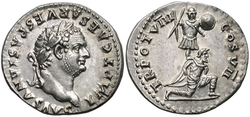Titus
| Titus | |||||
|---|---|---|---|---|---|
| Emperor of the Roman Empire | |||||
 Bust of Emperor Titus | |||||
| Reign | 24 June 79 – 13 September 81 | ||||
| Predecessor | Vespasian | ||||
| Successor | Domitian | ||||
| Born | 30 December 39 Rome | ||||
| Died | 13 September 81 (aged 41) Rome | ||||
| Burial | Rome | ||||
| Wives |
| ||||
| Issue | Julia Flavia | ||||
| |||||
| Dynasty | Flavian dynasty | ||||
| Father | Vespasian | ||||
| Mother | Domitilla the Elder | ||||


Titus (Titus Flavius Vespasianus, 30 December 39 – 13 September 81) was Roman Emperor from 79 to 81. A member of the Flavian dynasty, Titus succeeded his father Vespasian upon his death.[1][2]
Military service
[change | change source]Before becoming emperor, Titus gained renown as a military commander. He served as a military tribune in Germany and Roman Britain.
It was he who brought the reinforcements after the revolt of Boudicca. Two tribes had destroyed Colchester, London and St Albans, and wiped out a whole legion, but were finally defeated by the Roman governor of Britain.
Judaea
[change | change source]He served under his father in Judaea during the First Jewish-Roman War (66–70), where he commanded a legion. The campaign came to a brief halt with the death of emperor Nero in 68, but soon continued in the Year of the Four Emperors.
When Vespasian was declared emperor on 1 July 69, Titus was left in charge of ending the Jewish rebellion. In 70, he successfully laid siege to Jerusalem. He destroyed the city and Temple in Jerusalem. For this, Titus was awarded a Roman triumph.[3] To this day, the Arch of Titus commemorates his victory circa AD 70.
Rome
[change | change source]When Vespasian became Emperor, Titus and his brother Domitian received the title of Caesar from the Senate.[4] Titus held seven Roman consulships during Vespasian's reign[5] and acted as his secretary, appearing in the Senate on his behalf.[5]
Under the rule of his father, Titus gained notoriety in Rome as a ruthless Prefect of the Praetorian Guard.
Berenice
[change | change source]During the Jewish wars, Titus had begun a love affair with Berenice, sister of Agrippa II. The Herodians had collaborated with the Romans during the rebellion, and Berenice herself had supported Vespasian upon his campaign to become emperor.[6]
In 75, she returned to Titus and openly lived with him in the palace as his promised wife. The Romans were wary of her, and disapproved of their relationship. When the pair was publicly denounced by Cynics in the theatre, Titus caved in to the pressure and sent her away,[7] but his reputation suffered.
Emperor
[change | change source]
Titus ruled to great acclaim after the death of Vespasian in 79. He was considered a good emperor by Suetonius and other contemporary historians.
As emperor, he is best known for completing the Colosseum and for his generosity in relieving the suffering caused by two disasters, the Mount Vesuvius eruption of 79 and a fire in Rome in 80.
Because of his supposed vices, many Romans feared he would be another Nero.[8] But Titus proved to be an effective emperor and was well-loved when people found that he had virtues instead of vices.[8] One of his first acts as an emperor was to stop trials based on treason charges,[9] which had long plagued Rome.
Under Augustus, the law of treason had been revived and applied to cover slander and libel. This led to a long cycle of trials and executions under such emperors as Tiberius, Caligula and Nero. This spawned entire networks of informers who terrorized Rome for decades.[9] Titus put an end to this practice, against himself or anyone else, declaring:
"It is impossible for me to be insulted or abused in any way. For I do naught that deserves censure, and I care not for what is reported falsely".[10]
Consequently, no senators were put to death during his reign;[10] he thus kept to his promise that he would assume the office of Pontifex Maximus "for the purpose of keeping his hands unstained".[11] The informers were publicly punished and banished from the city. Titus then made it unlawful for persons to be tried under different laws for the same offense (double jeopardy|).[9] Finally, when Berenice returned to Rome, he sent her away.[8]
After barely two years in office, Titus died of a fever on 13 September 81. He was deified (declared a god) by the Roman Senate and succeeded by his younger brother Domitian.
References
[change | change source]- ↑ Cassius Dio, Roman History LXVI.18. Uchicago.edu.
- ↑ Brian Jones; and Robert Milns (2002). Suetonius: the Flavian Emperors: a historical commentary. London: Bristol Classical Press. p. 91. ISBN 1-85399-613-0.
- ↑ Josephus, Flavius 1981. The Jewish War, transl. G.A. Williamson, introduction by E. Mary Smallwood. Penguin, London.
- ↑ Cassius Dio. Roman history LXV.1
- ↑ 5.0 5.1 Suetonius, On the Life of the Caesars: Life of Titus 6
- ↑ Tacitus, Histories II.81
- ↑ Cassius Dio, Roman History LXV.15
- ↑ 8.0 8.1 8.2 Suetonius, Twelve Caesars, Life of Titus 7
- ↑ 9.0 9.1 9.2 Suetonius, Lives of Twelve Caesars, Life of Titus 8
- ↑ 10.0 10.1 Cassius Dio, Roman History LXVI.19
- ↑ Suetonius, Twelve Caesars, Life of Titus 9
